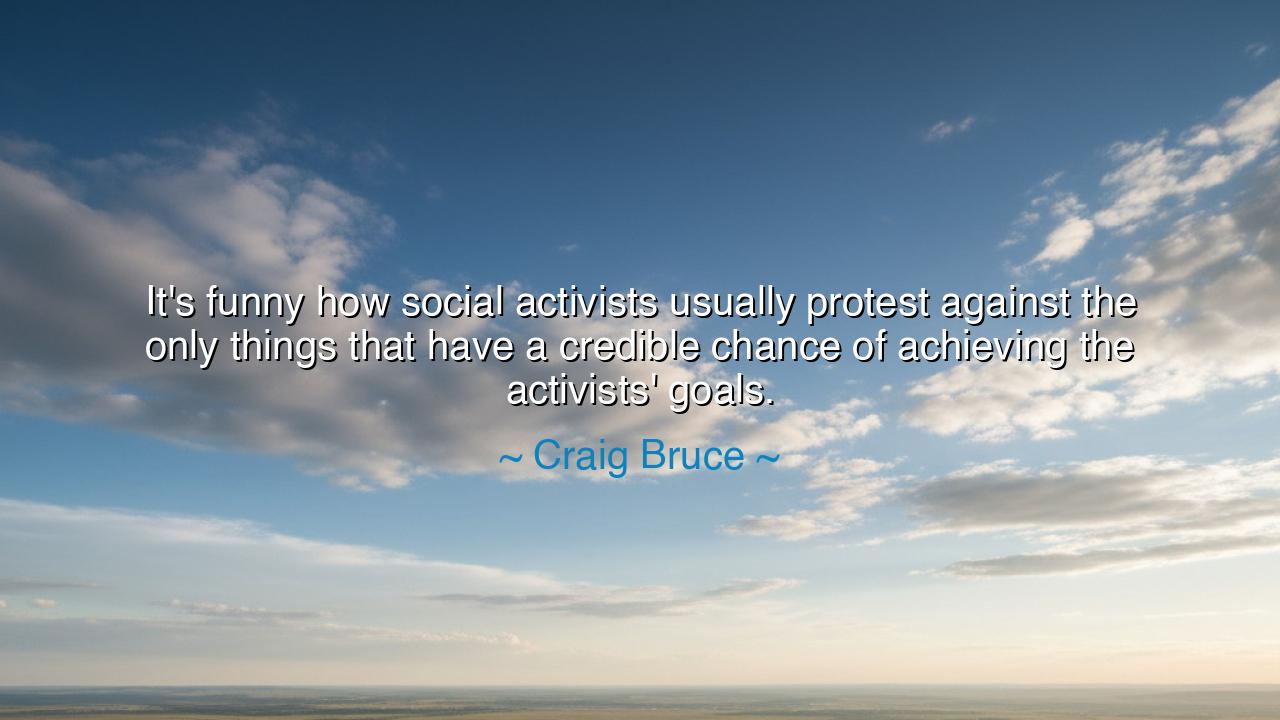
It's funny how social activists usually protest against the only
It's funny how social activists usually protest against the only things that have a credible chance of achieving the activists' goals.






In the eternal struggle for justice and progress, there are those who rise to the call of change, standing firm in the face of oppression and inequity. Yet, as Craig Bruce insightfully points out, "It's funny how social activists usually protest against the only things that have a credible chance of achieving the activists' goals." This paradox, though subtle, carries within it a powerful truth about the nature of protest, activism, and the forces that shape social change. For in every movement, there is often a tension between the ideals that drive it and the methods employed to achieve those ideals. Sometimes, the very actions meant to bring about change are the ones that obstruct the progress activists seek.
Throughout the annals of history, we see countless examples of social movements that, despite their passionate pursuit of justice, fail to align their protests with the paths most likely to create meaningful change. The French Revolution, for instance, was driven by the noble desire for liberty, equality, and fraternity. Yet, the revolutionaries' extreme actions, including the Reign of Terror, undermined their very goals by instilling fear and violence, rather than fostering unity and progress. The leaders who sought the end of tyranny inadvertently created a new form of oppression, proving that radical protest, if not guided by wisdom and foresight, can sometimes derail the very ideals it seeks to achieve.
Similarly, consider the American Civil Rights Movement, which brought great change to the United States. While it is often celebrated for its success, it also encountered moments when protestors, driven by their just cause, found themselves at odds with the methods employed. Martin Luther King Jr. understood the importance of non-violent resistance, of choosing actions that would inspire rather than divide. But others, in their righteous fury, sometimes chose more aggressive methods, which, though born of frustration, failed to win the hearts and minds of the larger public. The lesson here is clear: the means by which we seek change are as important as the change itself. If the path we take is destructive or divisive, it risks undoing the progress we strive for.
The wisdom of the ancients also speaks to this paradox. In the teachings of Aristotle, we find the idea of the golden mean—the notion that virtue lies not in extremes but in the balance between them. The pursuit of justice, therefore, must be tempered by prudence and strategy. Extremism, while sometimes born of noble intentions, often leads to the destruction of what it aims to protect. Just as a bow must be drawn with careful force, so too must activism be guided by wisdom, always mindful of the larger consequences of action.
In the modern world, this paradox continues to unfold. Consider the environmental movement, which rightly demands urgent action to combat climate change. Yet, in some cases, the very tactics employed—such as destruction of property or violent protests—can alienate those who might otherwise be allies. The path to environmental justice lies not in actions that alienate or polarize, but in strategies that build coalitions, that bring people together, and that recognize the interconnectedness of all people in the fight for the planet's future. Bruce’s insight invites us to reflect: Are we seeking to change the world, or are we merely protesting for the sake of protest?
The lesson that emerges from this reflection is not one of surrendering to complacency or inaction, but one of strategic engagement. Social activists must recognize the importance of aligning their protests with the means that are most likely to bring about their goals. True change requires more than passion—it requires wisdom, foresight, and a deep understanding of the systems they seek to transform. It is not enough to protest what is wrong; one must also understand and navigate the paths that lead to constructive change, seeking out opportunities for collaboration, and embracing methods that build rather than tear down.
Thus, dear traveler of truth and justice, the path to meaningful change is often difficult and fraught with challenges. In your own journey, remember that the methods you choose to achieve your goals are as significant as the goals themselves. The call to action must be guided not only by passion but by a clear understanding of the most effective and constructive paths. Let your actions align with the change you seek, and let your protests be born of wisdom, not of fury. In doing so, you will walk a path that leads to not only victory but to a lasting legacy of justice and unity.






AAdministratorAdministrator
Welcome, honored guests. Please leave a comment, we will respond soon